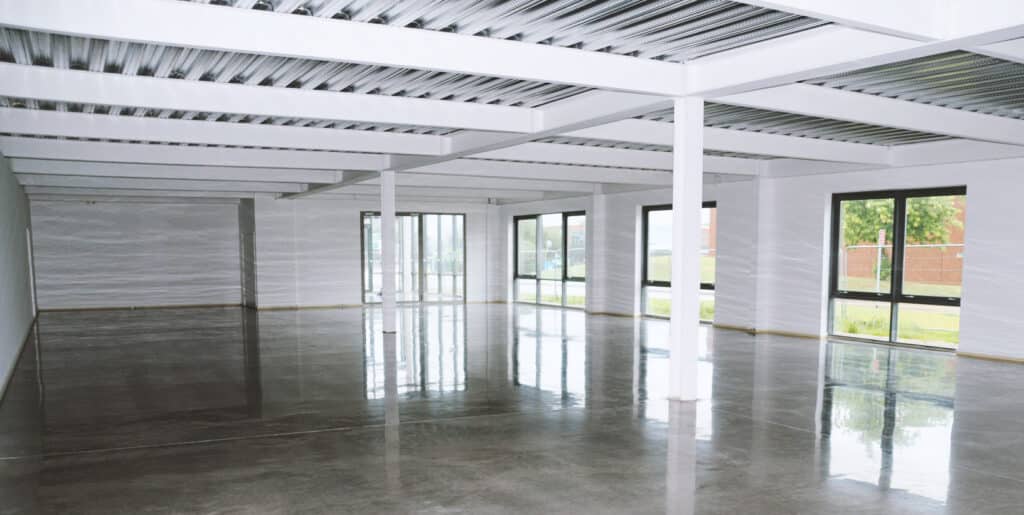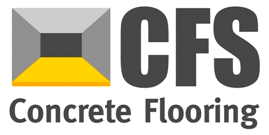What is the Best Non-Slip Flooring for Your Project?

In order to ensure the highest levels of health and safety in a business, or even to keep a large domestic property safe for residents, every part of it needs to be considered. This includes choosing the right kind of flooring. Ensuring you have non-slip flooring fitted in a home or business is one of the key actions you can take to prevent accidents. But which kind is best?
We offer a wide variety of flooring solutions for projects and our experts can help you to decide which type of non-slip flooring will be best for you.
What are the Best Non-Slip Floors?

There is a range of material options available that might be considered “best” for non-slippery flooring, including non-slip vinyl flooring. However, many of these are more suited towards interior domestic projects, need a lot of maintenance, or are best for areas where high foot traffic or vehicles are not likely to damage the floor. While this can cover commercial properties it could make them less suitable for use in certain industrial settings, especially where heavy machinery is used. Many types will also be unsuitable for outdoor projects.
To ensure your industrial, commercial, or even large-scale domestic flooring project is kept as hardwearing and maintenance-free as possible, you will need to use a heavy-duty flooring type. We can provide these in either resin or concrete flooring, the latter of which can also be made suitable for exterior use.
Anti-Slip Resin Flooring
We offer more than one type of anti-slip resin flooring. All of these are designed, made, and installed in accordance with the industry standard (the Concrete Society’s Technical Report 34), but we’ve elaborated on each of the different types below. This can help you to decide which will be best for your floors:
Epoxy Floor Paint
Designed to withstand high foot traffic and vehicle use, this option is ideal for heavy-duty commercial and industrial use and greatly enhances slip resistance. It is a water-based epoxy coating that can be implemented for a multitude of projects, from production areas and warehouses to showrooms. Its smooth surface also creates a more hygienic environment, as it is easy to clean.
Epoxy paint also assists in making a floor more durable, keeping it easy to maintain and guaranteeing a long-lasting floor for years to come.
Methyl Methacrylate Flooring
Methyl methacrylate resin can easily be altered to incorporate non-slip health and safety properties. It is also very fast curing, and our team will be able to lay and cure this flooring within the frame of a day if the needs of your project demand this.
This floor type offers fast curing, without compromising on durability or the smoothness of the finish. As a result, it will also be easy to clean and maintain, no matter what environment it has been installed in.
Polyurethane Resin Flooring
Both workshops and laboratory settings will benefit most from having this type of flooring installed. This is because the material is non-slippery, while also featuring enhanced chemical and temperature resistance. These properties should also make it a priority flooring material for many factory settings.
To see more about the benefits of using resin for your non-slip flooring, please see our page.
Making Anti-Slip Concrete Flooring
There are two prevalent ways that concrete flooring can be made non-slippery for both indoor and outdoor use. The first of these is to cover the floor with epoxy floor paint, as described above. The second method is to make the floor textured.
Textured Concrete
All concrete is safe to walk on when the surface is clean and dry, but if something has been spilt or the weather outdoors is wet or icy, it can quickly become a hazard. Applying textures to concrete in order to make it rougher will help to avoid this, especially in bathrooms and other interiors where an individual might accidentally slip. It is also an especially popular option for outdoor flooring, where a smoother surface isn’t vital to carrying out industrial operations.
How Much Does Non-Slip Flooring Cost?
The cost of laying any kind of non-slip flooring can vary greatly, depending on the size of the floor area that needs to be worked on. Other factors may also change depending on the type of flooring you are having installed. For instance, if you are interested in using epoxy resin for your flooring, you will also have to consider elements such as colouring and finishings.
Our team can discuss prices with you, and offer a more specific quote for your project when you contact us and let us know what you need.
Other Considerations to Make
When deciding on the best non-slip flooring for your project, it may be important to consider the following questions:
- Where is the floor to be laid? What type of area is it?
- Does the floor require aesthetic appeal or is it purely for practicality?
- Will heavy machinery, such as forklift trucks, need to be used on the flooring?
- How much time and money can you afford to spend on maintenance?
- Can you consider a combination of different flooring types to achieve different purposes?
Most of the time, choosing a material for non-slippery flooring will come down to personal preference. However, these questions can help you to narrow down your options if one type offers greater levels of durability or a better aesthetic appeal.
Order Non-Slip Concrete or Resin Flooring
If you require slip-resistant flooring to meet the health and safety specifications of an interior or exterior project, Concrete Flooring Solutions can help. Our experts all have Constructionline Gold membership and years of experience in skilfully installing a variety of flooring types. This includes floors that ensure the safety of visitors to commercial sites and residents of dwellings.
Find out more about how we can assist with your project by getting in touch with us today via our contact form. Alternatively, you can also call us to speak to a member of staff.
